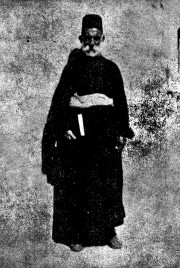

Chacham (a respected title used by Sefardic Jews for great rabbis) Ephraim’s father was a Rabbi in Tiberias, a leading man in the Arabic-speaking Jewish community. ChachamEphraim himself became esteemed and honored by Jews and Arabs alike and received a leading place in the community, becoming one of the dayanim, overseers of justice, who are specially entrusted with the rights and interests of the individuals of the community. Coincident with these advances he married the daughter of the Chief Rabbi.
Rav Ephraim eventually became friends with Rev. Dr. William Ewing, of the Church of Scotland in Tiberias, who spoke fluent Hebrew. The two men were of almost equal age and soon developed friendly talks about the Talmud and the Bible, but every conversation would eventually lead to claims of Yeshua as the Messiah.
The older Jewish interpretations of the fifty-third chapter of Isaiah were known as referring to the King Messiah, and it was not long before Chacham Ephraim recognized the picture of the Suffering Servant “by whose stripes we are healed.” The sufferings of his own people throughout the ages and their desperate outlook touched him deeply.
Guided by his friend he considered: “The first temple was destroyed and the nation scattered on account of three great sins committed by Israel, but seventy years later the temple was rebuilt. Then came the second destruction, and for over 1,800 years Israel has been without the Holy Temple. What was the cause of this second destruction and of the greater scattering? Idolatry was not the reason. There was no lack of zeal for either the Torah or for the sacrifices. Why has God forsaken us so long?” Rav Ephraim wept and prayed and struggled with the problems, unwilling to give in. He even asked questions about these things of his fellow rabbis, but they could only give the time-worn, formal answers.
Still he struggled, convinced that some terrible sin had been the cause of the wrath of HaShem against his people. Then there dawned upon him the secret of it all— “sinat chinam – hatred without a cause” (Yoma 9b), and a still, small voice expostulated with him, “Cease to hate Me. Love Me and I will give you peace.” The struggle was over. Chacham Ephraim found a peace that was unbroken until his dying day. What followed was a time of fierce persecution, where he lost everything, including his wife and family. Chacham Ephraim wandered to different cities and eventually settled in Jerusalem where he worked as a manual laborer, and in the evenings would meet with prominent individuals who would come secretly to talk with him. He also led studies in the Bible for other Jewish and Arab believers. He died in August 1930 and was buried in Jerusalem.
by Rabbi Joshua